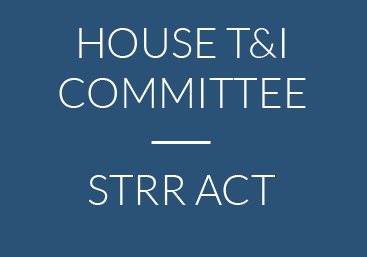
Ten amendments worth watching closely during today’s House markup

The House is beginning markup of their transportation reauthorization proposal right now (10 a.m. EDT) and we have the lowdown on eleven amendments worth keeping your eyes on out of the more than 160 that were filed.
Update 10/22 3:30 p.m.: The markup concluded after 3 p.m. on Thursday. Details are in the table below.
Our list begins with this amendment from Representatives Rodney Davis (R-IL) and Dina Titus (D-NV), which would do three basic things:
- Provide more flexible funds overall. The amendment increases the amount of funding in the federal Surface Transportation Program (STP) overall, which are the most flexible transportation dollars that can be invested in almost any type of local project, whether a project to improve a road, increase the reach of transit, or make a street safer for biking and walking.
- Send more money directly to local communities. The amendment increases the share of flexible STP funding that goes directly to local governments.
- Help smaller communities too. It also ensures that the smaller regions with less than 200,000 people that don’t directly control STP funding have more certainty over how the funds reserved for their areas will be spent. This is accomplished by requiring the state to only fund the projects that local communities actively apply for. A new reporting process would make clear to the public which projects applied for funding and how the state prioritized and selected them.
Our full explainer on the amendment is here.
The time is short to get supportive votes for this amendment this morning, so send a message to your representative, especially if yours sits on the T&I Committee in the House. Even without a representative on the committee, you can still send a message to yours and urge them to call their colleagues this morning. We’re working hard to get enough votes for this bill and we need every bit of help possible.
Amendment tracker
We’ll be tracking the outcomes on these amendments in realtime during the markup in the table below (refresh the page), and follow us on Twitter along the way. @T4America The markup is over and the details are in the table below. Below the table is a short summary of each amendment.
| Amendment | Offered by | Outcome? |
|---|---|---|
| Local control & transparency | Reps. Davis & TItus | Offered and withdrawn |
| Safe streets language | Reps. Curbelo and Titus | Included in approved manager's package; not modified. |
| Transit-oriented development in TIFIA | Rep. Donna Edwards | Withdrawn, opposed by Chairman Shuster |
| Job connections | Reps. Sires and Costello | Included in approved manager's package; the "shall" changed to "may". |
| Gas tax indexing | Rep. Barletta | Offered and withdrawn |
| Project selection transparency and performance | Reps. Bustos and Crawford | Not addressed during markup |
| Preserving transit and highway equity | Reps. Nadler and Lipinski | Offered and withdrawn. Assurances from Reps. Shuster and Defazio that they will address. |
| Eliminating public transportation | Rep. Sanford | Not addressed during markup |
| FUTURE Trip Act (Research) | Rep. Lipinski | Offered and withdrawn |
| Improving national freight program | Reps. Lipinski, Nadler, Brown & Sires | Offered and withdrawn |
| Local hire | Rep. Napolitano | Offered and withdrawn |
The amendments
1) Transparency and local control – Reps. Davis and Titus
Covered above.
2) Safe Streets – Reps. Curbelo and Titus
The House bill already includes some language encouraging states and metropolitan planning organizations to plan and design for the safety needs of all users—regardless of age, ability, or mode of transportation—in federally-funded projects. This amendment would improve that language by requiring the U.S. Department of Transportation to provide regular updates on states’ progress and best practices. The majority of pedestrian deaths occur on roads which are subject to federal oversight, but which are too often designed and operated only for speeding traffic—even in areas near homes or schools, and where people of all ages and abilities are out walking. The Safe Streets Amendment would help make sure these roads are planned and designed for the safety of all users.
3) Transit-oriented development in TIFIA – Rep. Donna Edwards
This amendment would expand the eligibility in the federal Transportation Infrastructure Finance and Innovation Act (TIFIA) loan program to include transit-oriented development (TOD) projects, and lower the minimum project cost down to $10 million to help include smaller projects in this innovative financing program. Demand for living near transit is projected to double over the next 20 years to over 15 million households and to meet this demand, significant new development near transit stations will be needed. This kind of amendment would make TOD projects easier by making them eligible for TIFIA financing.
4) Job connections (The Commute Less Act) – Reps. Sires and Costello
This amendment would expand transportation options for commuters (with a focus on low-income communities) by leveraging the resources of employers and the private sector. Larger metropolitan areas would be required to develop regional goals to reduce vehicle miles traveled during peak commuting hours and improve transportation connections between areas with lots of jobs and areas where low-income households are concentrated. They would be required to identify existing public transportation services and employer-based commuter programs that support better access to jobs and identify proposed projects and programs that could reduce congestion and help connect more people to jobs.
This is modeled after the successful Commuter Trip Reduction program in Washington State, which we profiled indirectly in this case study on a vanpooling program there. T4America endorsed this amendment, and we believe it’s included in the manager’s package of amendments, though it was modified on its inclusion.
5) Gas tax indexing — Rep. Barletta
This amendment would index the gas tax to inflation and establish a congressional task force on the Highway Trust Fund to report out bill language on increases to the gas tax or other funding changes that could be fast-tracked in the House — with mandatory votes required and no amendments possible.
6) Project selection transparency and performance – Reps. Bustos and Crawford
The Metropolitan Planning Enhancement Act would both rebuild public trust by increasing transparency with how transportation projects are selected and ensure that limited funds are invested efficiently, by prioritizing projects that bring the most value to a state or region. Projects included and described in state or metropolitan transportation plans would be scored against other projects and selected against criteria that supports national and state goals. Most states currently have limited to no criteria, which make it challenging for the public to understand how their funds are being spent or how any additional revenue would improve their daily commute.
This is a start toward removing politics from the project selection process and ensuring that our limited resources are invested in projects that provide the highest return on investment. T4America endorsed this amendment.
7) Preserving transit and highway equity – Reps. Nadler and Lipinski
The House’s draft reauthorization included a dangerous provision that would lower the share that the federal government pays on new transit projects from 80 percent down to 50 percent. The federal match for highway projects would remain at 80 percent. While the federal government usually ends up only paying 50 percent of the costs for most transit projects because of the long line of projects applying for these limited transit funds in any given year, it’s important that we keep the playing field level and equitable between highway and transit projects. And with more general taxpayer funds being transferred to keep the trust fund afloat over the life of this bill, it’s even more important to keep the matches equitable. This amendment would eliminate that provision and preserve the 80 percent match.
8) Eliminating public transportation – Rep. Sanford
This amendment would cut the entire transit title (Title 49 chapter 53) from the bill, essentially eliminating all public transportation funding and policy from the House’s proposal. This amendment is a non-starter.
9) FUTURE Trip Act (Research) – Rep. Lipinski
This amendment would “support innovative technologies” and research into things like the deployment of technologies for connected and autonomous vehicles, among many other projects to improve research and data collection. Read the full summary of the amendment’s provisions here.
10) National Freight and Highway Projects – Reps. Lipinski, Nadler, Brown & Sires
There’s a freight program in the House bill, but it places arbitrary caps on how much money can be spent on any mode of freight transport, instead of letting states or metro areas decide themselves how to most efficiently invest their freight dollars to keep things moving. This amendment would remove the arbitrary cap on the amount of funding that can be spent on multimodal freight projects.
11) Local hire – Rep. Napolitano
Enables local hiring preferences to be considered during the procurement process on transit projects as long as one local jurisdiction within the entire region has per capita income of 80 percent or less of the national average or an unemployment rate that is 1 percent greater than the national average.



